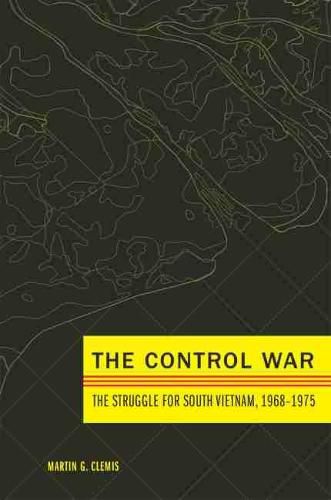Readings Newsletter
Become a Readings Member to make your shopping experience even easier.
Sign in or sign up for free!
You’re not far away from qualifying for FREE standard shipping within Australia
You’ve qualified for FREE standard shipping within Australia
The cart is loading…






The Vietnam War - a conflict defined by an ever-evolving mixture of conventional and guerrilla warfare and mass politics - has often been called a
war without fronts.
In fact, Vietnam had a multitude of fronts, as insurgents and counterinsurgents wrestled for control throughout 44 provinces, 250 districts, and more than 11,000 hamlets. In The Control War, Martin G. Clemis focuses on South Vietnam, where a highly complex politico-military struggle fragmented the battlefield along countless divergent points of conflict as both sides sought spatial and political hegemony.
Complicating the conventional view that the Vietnam War was about winning
hearts and minds,
Clemis argues that both sides were more interested in asserting control over the people - and resources - of the countryside. As in other revolutionary civil conflicts, the key to winning political power in South Vietnam was to control the physical world of territory, population, and resources, as well as the ideational world of political organization and long-term legitimacy. Despite their countervailing purposes, both insurgency and pacification provided the means to exert this control. Proponents of each approach pursued the same goals, relying on a blend of military force, political violence, and socioeconomic policy to achieve them.
Revealing the unique spatiality of the Vietnam War, The Control War analyzes the ways that both sides of the conflict conceptualized and used geography and the environment to serve strategic, tactical, and political ends. Clemis shows us that the operational environment of Vietnam, both natural and human-made, was far more than a backdrop to two decades of war.
$9.00 standard shipping within Australia
FREE standard shipping within Australia for orders over $100.00
Express & International shipping calculated at checkout
The Vietnam War - a conflict defined by an ever-evolving mixture of conventional and guerrilla warfare and mass politics - has often been called a
war without fronts.
In fact, Vietnam had a multitude of fronts, as insurgents and counterinsurgents wrestled for control throughout 44 provinces, 250 districts, and more than 11,000 hamlets. In The Control War, Martin G. Clemis focuses on South Vietnam, where a highly complex politico-military struggle fragmented the battlefield along countless divergent points of conflict as both sides sought spatial and political hegemony.
Complicating the conventional view that the Vietnam War was about winning
hearts and minds,
Clemis argues that both sides were more interested in asserting control over the people - and resources - of the countryside. As in other revolutionary civil conflicts, the key to winning political power in South Vietnam was to control the physical world of territory, population, and resources, as well as the ideational world of political organization and long-term legitimacy. Despite their countervailing purposes, both insurgency and pacification provided the means to exert this control. Proponents of each approach pursued the same goals, relying on a blend of military force, political violence, and socioeconomic policy to achieve them.
Revealing the unique spatiality of the Vietnam War, The Control War analyzes the ways that both sides of the conflict conceptualized and used geography and the environment to serve strategic, tactical, and political ends. Clemis shows us that the operational environment of Vietnam, both natural and human-made, was far more than a backdrop to two decades of war.